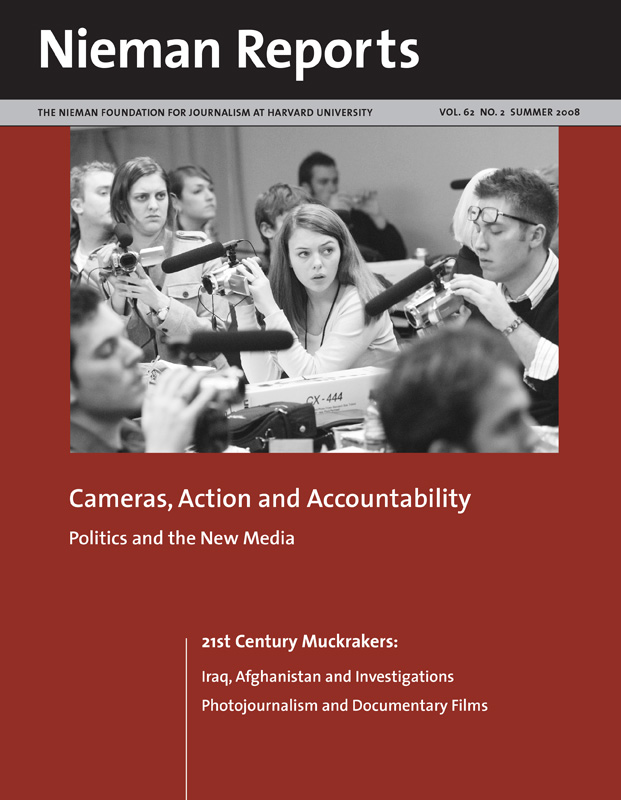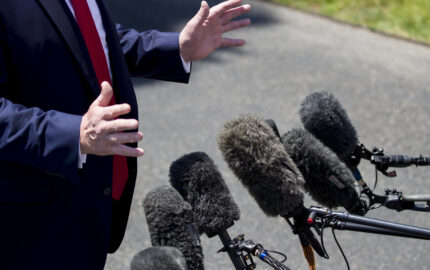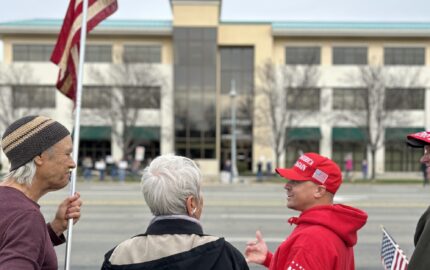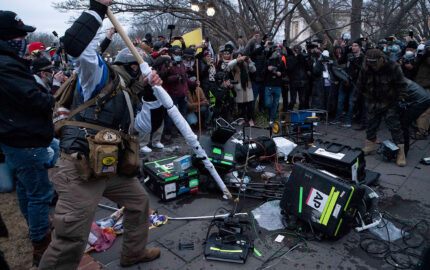I remember the moment when I realized we are living in the Networked Age. In early 2004, I had gotten an assignment from The Nation, where I had spent many years earlier as an editor, asking me to explore the underlying dynamics of Howard Dean's political ascent. And so I started traveling to various technology conferences to gather string, and one day I was in San Diego for the "Digital Democracy Teach-In," a one-day event preceding the annual ETech confab, put on by Internet publisher Tim O'Reilly, who was soon to coin the term "Web 2.0." There, on stage, was Dean's campaign manager, Joe Trippi, being interviewed by Ed Cone, an industry journalist who had done some in-depth pieces on the campaign.
Here's what struck me: Of the 400 or so people in the audience, at least half had their laptops open, and they weren't taking notes. They were typing messages to each other, participating in a live chat-room using the conference's free Wi-Fi service. And their "back-channel" conversation — full of pithy and funny riffs on Trippi and Cone's talk, along with side jokes and questions about where to go out for lunch — was being projected on a big screen behind the stage for all to read.
It was a disconcerting and exhilarating moment, showing me exactly how the Internet can give everyone a voice in the public conversation and how the lateral networking between tech-empowered individuals could open up a top-down forum (like a conference keynote) and make it into something far more interesting and participatory.
I was hooked. Over the course of that year, I wrote several articles about this phenomenon, culminating in a long feature for The Nation that was titled "The Rise of Open-Source Politics." I also decided to reinvent my career, shifting my time from advocacy writing for a public interest group to linking up with a new partner, Andrew Rasiej, and launching the Personal Democracy Forum as an annual conference and daily blog for everyone interested in how technology is changing politics.
The Web as a Political Force
Fast forward to December 2006. We get an e-mail headlined: "'Students for Barack Obama' Launches Web Site Supported by 24,000 Members, Translating Online Social Networking Into Real National Activism." Another light bulb goes off. Andrew and I realized that for all the noise about the Internet's impact in 2004, in 2008 it would be a much bigger factor. Voter-generated content — new groups with masses of members, new messages created and spread by laterally connected Internet users, and new money centers — was going to be the wild card of 2008. No longer does anyone need a lot of money to connect with millions of voters; all that's needed is a compelling message. The top-down campaign is over; those once in command have now lost control.
So we decided to start a new group blog, techPresident.com, and invited a bipartisan group of e-campaign veterans and pioneers to join us, drawing on the community we had built around Personal Democracy Forum. From the beginning, we decided our site would not be a typical political blog. For starters, our focus would be on "how the candidates are using the Web and how the Web is using them," not which candidates are up or down in the horserace or why a particular candidate does or doesn't deserve to be President. And even though our Web site's bloggers have partisan backgrounds, their partisan boosterism has to happen someplace else. On techPresident.com, any and all campaign affiliations have to be disclosed to our readers.
In time, techPresident became one of the few places on the Web where poli-techies of all stripes talk shop. Here readers find Michael Turk and Patrick Ruffini, former e-campaign directors for the Republican National Committee, praising Barack Obama's Web tactics, and Zephyr Teachout, former director of online organizing for Dean, praising Republican Mike Huckabee's online efforts. One of our bloggers, Mindy Finn, went off to run Mitt Romney's e-campaign and another, Tracy Russo, just joined us after being John Edwards' lead blogger. What unites our contributors is not only their interest in the game but also a belief that the Networked Age is opening up the political process, creating new opportunities for individual citizens to participate more fully, and forcing campaigns and institutions — including political journalists — to adapt.
The Web and Political Journalism
Whether it's the impact of YouTube or the dynamics of social networking — issues we cover intensively — the Web's role in the political race is becoming a topic that political reporters realize they can no longer ignore. During the past year and a half, as we have built up the site, I have been consistently surprised by the volume of calls we get from journalists asking for help understanding this new medium. I don't mind taking their calls — especially if it helps spread the word about techPresident and Personal Democracy Forum — but in the spirit of expanding media literacy and perhaps letting me spend more time on my own work, here are a few pointers that I typically share:
Whatever happens on November 4th, we are living in changing times. Personally, I am intrigued by the idea that whoever the next President is, the Networked Age is going to change not only election campaigns, but governance as well. That's the next big story to follow.
Micah L. Sifry is cofounder and editor of techPresident.com. He writes about politics for numerous publications and periodically teaches a course, "Writing Politics," at the City University of New York/Graduate Center.
Here's what struck me: Of the 400 or so people in the audience, at least half had their laptops open, and they weren't taking notes. They were typing messages to each other, participating in a live chat-room using the conference's free Wi-Fi service. And their "back-channel" conversation — full of pithy and funny riffs on Trippi and Cone's talk, along with side jokes and questions about where to go out for lunch — was being projected on a big screen behind the stage for all to read.
It was a disconcerting and exhilarating moment, showing me exactly how the Internet can give everyone a voice in the public conversation and how the lateral networking between tech-empowered individuals could open up a top-down forum (like a conference keynote) and make it into something far more interesting and participatory.
I was hooked. Over the course of that year, I wrote several articles about this phenomenon, culminating in a long feature for The Nation that was titled "The Rise of Open-Source Politics." I also decided to reinvent my career, shifting my time from advocacy writing for a public interest group to linking up with a new partner, Andrew Rasiej, and launching the Personal Democracy Forum as an annual conference and daily blog for everyone interested in how technology is changing politics.
The Web as a Political Force
Fast forward to December 2006. We get an e-mail headlined: "'Students for Barack Obama' Launches Web Site Supported by 24,000 Members, Translating Online Social Networking Into Real National Activism." Another light bulb goes off. Andrew and I realized that for all the noise about the Internet's impact in 2004, in 2008 it would be a much bigger factor. Voter-generated content — new groups with masses of members, new messages created and spread by laterally connected Internet users, and new money centers — was going to be the wild card of 2008. No longer does anyone need a lot of money to connect with millions of voters; all that's needed is a compelling message. The top-down campaign is over; those once in command have now lost control.
So we decided to start a new group blog, techPresident.com, and invited a bipartisan group of e-campaign veterans and pioneers to join us, drawing on the community we had built around Personal Democracy Forum. From the beginning, we decided our site would not be a typical political blog. For starters, our focus would be on "how the candidates are using the Web and how the Web is using them," not which candidates are up or down in the horserace or why a particular candidate does or doesn't deserve to be President. And even though our Web site's bloggers have partisan backgrounds, their partisan boosterism has to happen someplace else. On techPresident.com, any and all campaign affiliations have to be disclosed to our readers.
In time, techPresident became one of the few places on the Web where poli-techies of all stripes talk shop. Here readers find Michael Turk and Patrick Ruffini, former e-campaign directors for the Republican National Committee, praising Barack Obama's Web tactics, and Zephyr Teachout, former director of online organizing for Dean, praising Republican Mike Huckabee's online efforts. One of our bloggers, Mindy Finn, went off to run Mitt Romney's e-campaign and another, Tracy Russo, just joined us after being John Edwards' lead blogger. What unites our contributors is not only their interest in the game but also a belief that the Networked Age is opening up the political process, creating new opportunities for individual citizens to participate more fully, and forcing campaigns and institutions — including political journalists — to adapt.
The Web and Political Journalism
Whether it's the impact of YouTube or the dynamics of social networking — issues we cover intensively — the Web's role in the political race is becoming a topic that political reporters realize they can no longer ignore. During the past year and a half, as we have built up the site, I have been consistently surprised by the volume of calls we get from journalists asking for help understanding this new medium. I don't mind taking their calls — especially if it helps spread the word about techPresident and Personal Democracy Forum — but in the spirit of expanding media literacy and perhaps letting me spend more time on my own work, here are a few pointers that I typically share:
- The Web is just people. If it's happening in the "real world," the Web will reflect that. What's new is that the Web has made it possible for millions of people to participate, on a daily basis, in creating the political campaign — not just validating its results on Election Day.
- Political bloggers are just people using new communications tools. Don't fetishize them any more than you would "telephoners." They are activists, to be sure, but they are as diverse as any random group of political activists.
- Online political activists — the people who are not only looking on the Web for political information but also creating and sharing their own — correlate closely to the more politically active people in any community. As such, they are disproportionately influential and worth tracking.
- Online measures like how many "friends" a candidate has on Facebook or MySpace or how many blog posts mention a candidate's name (which we chart on techPresident) give us a rough sense of organic interest among political influentials for each of the candidates. They're sort of like digital bumper stickers but far more useful to the campaign and observers alike.
- Since the beginning of 2007, overall online interest in the Democratic field has outpaced the Republican field by two-to-one.
- When Clinton campaign chief strategist Mark Penn was quoted as saying that "Our people look like caucus goers; their people look like Facebook," he was making a big mistake.
- The Obama campaign has proven that in a Networked Age, it is more important to build a social network online, not just a big e-mail list.
- Right now, the level of organic activity online on behalf of Barack Obama outpaces that for John McCain by about 10-to-one.
Whatever happens on November 4th, we are living in changing times. Personally, I am intrigued by the idea that whoever the next President is, the Networked Age is going to change not only election campaigns, but governance as well. That's the next big story to follow.
Micah L. Sifry is cofounder and editor of techPresident.com. He writes about politics for numerous publications and periodically teaches a course, "Writing Politics," at the City University of New York/Graduate Center.



